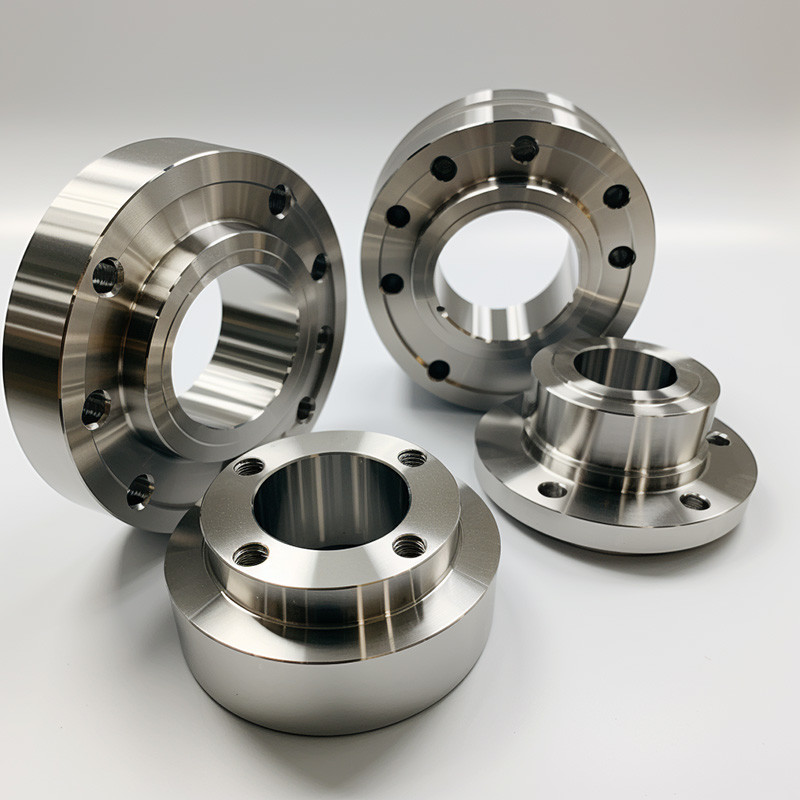Dongguan Yexin Intelligent Technology Co., Ltd. |
|
Verified Suppliers
|
|
CNC machining, standing for Computer Numerical Control machining, is a subtractive
manufacturing technology where material is automatically removed from raw stock according
to computer-generated instructions. In broad terms, CNC machines are categorized into two
types: those that keep the raw stock stationary while rotating the cutting tool, and those that
rotate the raw stock while moving it against a stationary tool.
Various deviations and combinations of these basic approaches exist, allowing some machines to
employ both techniques simultaneously to produce parts with intricate features.
Product Details
Stainless steel is highly resistant to corrosion and rust, making it suitable for situations
where a part may be exposed to the elements for a long period of time.
Stainless steel is also fairly malleable and ductile.
| Common Stainless Steel Materials | |
| No. | Properties |
| Stainless steel 304/304L | The most common alloy and is known for its pristine surface finish. It has significantly higher corrosion and oxidation resistance. Typically used in the manufacture of sensor parts, shafts, machinery parts, medical parts, and more. |
| Stainless steel 316/316L | It is slightly higher levels of chromium and nickel that exhibits improved heat tolerance, resistance to creep and pitting, and excellent tensile strength. Typically used in the manufacture of sensor, chemical & pharmaceutical equipment parts, and more. |
| Stainless steel 303 | It is a non-magnetic, austenitic stainless steel with good resistance to mildly corrosive atmospheres, but significantly less than 304. Typically used in the manufacture of screw, gears, fittings, bushings, shaft, and more. |
| Stainless steel 420 | It is a martensitic stainless steel with good corrosion resistance as well as strength and hardness. It is capable of being heat treated to a hardness of HRC 51 minimum. Typically used in the manufacture of pivots, cams, pump shafts, surgical instrument parts, valve components, and more. |
| Stainless steel 440C | It is a martensitic stainless steel, and is the highest carbon content from 400 stainless steel series. It is usually heat treated to reach hardness of 58 - 60 HRC. Typically used in the manufacture of valve seats, piston, shaft, and more. |
| Stainless steel 430 | It is a non-hardenable ferritic stainless steel with excellent finish quality. It has good corrosion resistance with good formability and ductility. Typically used in the manufacture of fittings, flanges fasteners, piston, and more. |
| Stainless steel 430FR | It is a free-machining solenoid quality alloy, ideal for parts that require corrosion resistance and high electrical resistivity. It has excellent corrosion resistance in fresh water, gaseous, moderately acidic, and low chlorine environments. |
| Stainless steel 630 | It is commonly referred to as 17-4 and is a precipitation-hardening martensitic stainless steel that offers superior corrosion resistance. It is magnetic, readily welded. Typically used in the manufacture of sensor housing, valve, pump shaft, and more. |



Stainless Steel Finishing and Post-Processing
We specialize in the production of custom-made products and offer surface treatment services
tailored to meet our customers' specific requirements and industry standards.
Our comprehensive solutions are both efficient and cost-effective, making us a one-stop
destination with the capacity and capability to provide integrated services.
| Name | Can be Applied with |
| Electropolishing | — |
| Electroless nickel plating | Media Blasting, Tumbling |
| Media Blasting | All post processes except Electropolish and Powdercoat |
| Nickel Plating | Media Blasting, Tumbling |
| Passivation | Black Oxide, Electroless Nickel Plating, Zinc Plating, Tumbling, Media Blasting |
| Tumbling | All post processes except Electropolish and Powdercoat |
| Zinc Plating | Media Blasting, Tumbling, Passivation |
| Powder coating | — |
| Black oxide | Media Blasting, Tumbling, Passivation |
Applications of Stainless Steel Parts
Turning, a precision manufacturing process, specializes in creating rotational and axi-symmetric
parts endowed with various features such as holes, grooves, threads, tapers, and contoured
surfaces. It excels in the production of limited-quantity components, particularly custom-designed
shafts and fasteners used in prototypes.
Additionally, turning serves as a valuable secondary process, allowing the addition or refinement
of features to parts manufactured using alternative methods. Noteworthy examples of products
crafted through turning encompass camshafts, crankshafts, baseball bats, bowls, cue sticks,
signboards, musical instruments, and table and chair legs.

Company Profile


FAQ's
1. What cosmetic standards do you guarantee?
Ensuring high-quality finishes, all CNC machined parts undergo standard deburring and
edge-breaking procedures. Critical edges requiring a sharp finish must be explicitly highlighted
in technical drawings.
Surfaces are guaranteed to be free from defects such as scratches, dents, stains, blemishes,
hanging marks, and minor imperfections. Specifically, critical surfaces (primary (a) side, per
technical drawings) will be devoid of mill steps and other marks.
On the secondary (b) side, minor hanging marks and up to 2 minor defects are considered
acceptable. To further enhance surface quality, visual appeal, and wear resistance, a variety of
post-processing and finishing methods can be applied to CNC machined parts.
2. What are the advantages of CNC machining?
CNC machining offers a spectrum of advantages, prominently featuring rapid prototyping and the
expedited production of full-scale parts. Its hallmark is the ability to achieve exceptional precision
and accuracy in manufacturing, catering to tight tolerances for CNC parts of diverse sizes.
This method stands out for its flexibility, influencing factors such as volume, pricing, lead times,
and the array of materials and finishes available.
3. How quickly can I get my parts?
With complete 2D and 3D CAD models, we can manufacture quality parts in just two weeks.
However, for more complex parts with special features, additional time may be required.
Request a quote for accurate lead times tailored to your project.
Shipping is primarily done via air freight, taking only a few days
from China to Europe or North America.
4. Can I use my own material for production?
Absolutely, you can use your own material for production, as long as it aligns with the capabilities of
our machines.